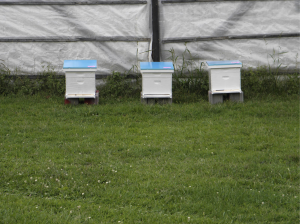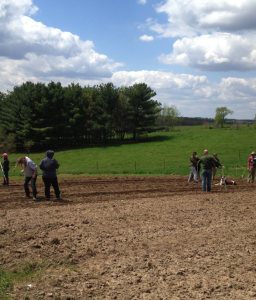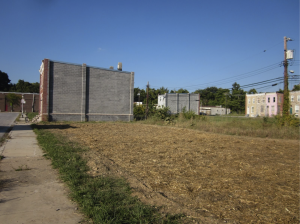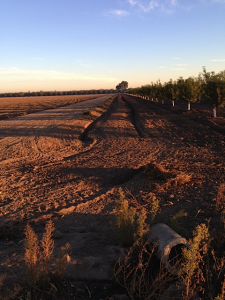For small farms, harvest season brings to fruition months of thought, care, and toil. It marks the end of summer and is a time to celebrate the results of hard work. The recipients of The FruitGuys Community Fund 2014 small farm sustainability grants were awarded a total of $30,000 in April 2014 based on their scores for 2014’s areas of focus: pollination, pest control, soil health, and low income food access. The 2014 grantees are located in California, Maryland, Wisconsin, Illinois, and Pennsylvania and represent family farms of different sizes and generations, as well as non-profit organizations.
The FruitGuys Community Fund 2014 Grantees
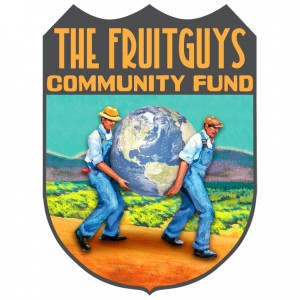 As another season commences, this year’s grantees are celebrating the construction of beehives and bat boxes, the planting of pollinator hedgerows, and the installation of drip irrigation systems, raised beds, and hoop houses. Here are some updates on how their projects are going.
As another season commences, this year’s grantees are celebrating the construction of beehives and bat boxes, the planting of pollinator hedgerows, and the installation of drip irrigation systems, raised beds, and hoop houses. Here are some updates on how their projects are going.
2014 Grantees: Clear Spring Farm in Easton, PA; Bountiful Hope Farms in Monroe, WI; Real Food Farm in Baltimore, MD; Black Oaks Center for Sustainable Renewable Living in Pembroke, IL; Woodleaf Farm in Oroville, CA; Friends of Great Kids Farm in Baltimore, MD; Lagier Ranches in Escalon, CA; Gabriel Farm in Sebastopol, CA.
Clear Spring Farm in Easton, PA, received a $4,000 grant for six beehives and equipment. The 23-acre farm has been in farmer Terry Kromer’s family since the 1930s. The bees will increase crop pollination, provide honey for their CSA, and implement education opportunities for local students and visitors on the importance of honeybees in agriculture.
September 2014 update: “We have purchased our beehives and constructed them. We will not be able to put honeybees in the hive until spring and are anxious to start our project. Most of the equipment has been ordered and delivered to us, but some items are on back order and will be delivered soon. The honey bees will be ordered in October. The beehives were constructed near our high tunnel greenhouses, which hold strawberry plants, tomatoes, and peppers at this time. Thanks to The FruitGuys Community Fund for allowing us to participate in this project!” – Terry Kromer, Farm Owner
Bountiful Hope Farms in Monroe, WI, received a $2,750 grant to install a drip irrigation system, hoop houses, and raised beds on a 3-acre farm that serves those in need. The non-profit organization donates 100% of their produce to 9 food pantries and 1 food bank in their local communities.
September 2014 update: “The drip irrigation system funded by the FruitGuys grant made it possible to expand and provide more produce to those in need. As of today, we have donated almost 7,000 pounds of produce to nine food pantries and one food bank…what makes this more remarkable is that we don’t focus on the “heavy” vegetables, but instead donate as wide a variety as possible to ensure that everyone finds something they like among the donation packages we provide…We are also looking forward to extending the donation season with the hoop house and cold frames. We have 6 raised beds installed in the hoop house and 3 cold frames installed. Our goal is to grow cool weather crops to allow donations into the fall and even winter. We also have several rows of produce in the garden itself planted to cold weather crops, which we will cover with floating row cover to keep them growing even after the first frosts. It has been a tremendous and inspiring year.” – Melissa Burch, Founder and Project Manager
Real Food Farm in Baltimore, MD, received a $5,000 grant for soil remediation, pollinator habitat installation, and seed cover crop for a new 1.5 acre urban farm site converted from a vacant lot. The non-profit is a project of CivicWorks, Baltimore’s urban service corps and an Americorps program, that strengthens communities through education, skill development, and community service.
September 2014 update: “We’re chugging away getting our Perlman Place site plowed, composted, and planted thanks to The FruitGuys Community Fund grant. We had intended on planting the berry plants in the fall, but we now realize that it’d be better to plant them in the spring of 2015 so we have better stock to select from.” – Shelley White, Program Coordinator
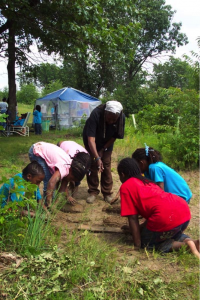 Black Oaks Center for Sustainable Renewable Living in Pembroke, IL, received a $3,570 grant for a 3-acre blueberry patch, beehives, compost system, bat boxes, cabbage moth screen netting system, and support for their urban farm education program. The non-profit organization is a farm and eco campus in the historic African American township of Pembroke, IL, and a learning center and CSA in Chicago.
Black Oaks Center for Sustainable Renewable Living in Pembroke, IL, received a $3,570 grant for a 3-acre blueberry patch, beehives, compost system, bat boxes, cabbage moth screen netting system, and support for their urban farm education program. The non-profit organization is a farm and eco campus in the historic African American township of Pembroke, IL, and a learning center and CSA in Chicago.
July 2014 update: “After battling several very high wind storms and rain like we have never had before. We have about twenty baby lowbush blueberry bushes our son found in a wooded area at the training center. We will transplant them — after the harvest this fall. We got 15 Elliots and 15 Dukes, highbush blueberries, that we were able to purchase because of The FruitGuys Community Fund grant. We are looking forward to planting.” – Fred Carter, Founder
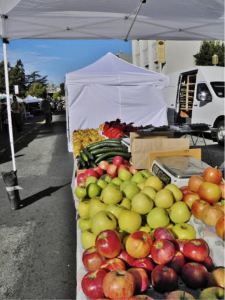 Woodleaf Farm in Oroville, CA, received a $2,252 grant to document the biological and economic sustainability of agro-ecosystem farming techniques. Owners Carl Rosato and Helen Atthowe are leaders in farm design that suppresses pests and soil management practices that improve plant health. Their approach to organic orchard management leads to decreasing the use of chemical fertilizer and pest control methods and reduces labor costs. They will share their findings on the research site eOrganic.
Woodleaf Farm in Oroville, CA, received a $2,252 grant to document the biological and economic sustainability of agro-ecosystem farming techniques. Owners Carl Rosato and Helen Atthowe are leaders in farm design that suppresses pests and soil management practices that improve plant health. Their approach to organic orchard management leads to decreasing the use of chemical fertilizer and pest control methods and reduces labor costs. They will share their findings on the research site eOrganic.
September 2014 update: “Thanks to the FruitGuys Community Fund grant we were able to document our unique nitrogen cycling and mineral balancing soil management system that works in a synergistic manner and mimics nutrient cycling in a natural forest system. This year, Woodleaf looked closely at the yield, fruit quality, leaf fertility, and soil health interaction. We performed fruit tissue analysis on 3 random samples of O’Henry peaches and took leaf tissue and soil samples from the same rows of O’Henry peach trees. Also in 2014, organic nitrogen was sampled in 5 fields. Woodleaf’s fruit samples were compared to 3 random samples of O’Henry peaches from two other long-term, organic fruit farms, in northern California. In 2014, we recorded the highest yield in 34 years. Peaches, pears, and apples were not sprayed in 2014, yet insect and disease damage was very low.” – Helen Atthowe, Co-Owner
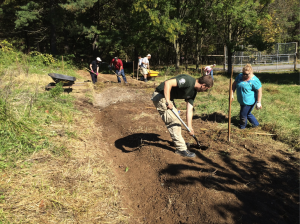 Friends of Great Kids Farm in Baltimore, MD, received a $5,000 grant to plant a nursery orchard of low-maintenance, schoolyard-growable fruit trees, brambles, vines, and shrubs in order to supply current and future school garden sites with stock for planting. The non-profit organization operates a 33-acre farm owned by Baltimore City Public Schools. Farm produce is used by city schools and sold to local restaurants.
Friends of Great Kids Farm in Baltimore, MD, received a $5,000 grant to plant a nursery orchard of low-maintenance, schoolyard-growable fruit trees, brambles, vines, and shrubs in order to supply current and future school garden sites with stock for planting. The non-profit organization operates a 33-acre farm owned by Baltimore City Public Schools. Farm produce is used by city schools and sold to local restaurants.
October 2014 update: “Our farmer has designed the site with the support of a forest gardening consultant. The site will serve as a demonstration of low-maintenance fruit species appropriate for school yard cultivation, a source of fruit for classroom tastings, and a source of cuttings for propagating fruiting trees and shrubs for school yard gardens. We’ve created a planting list, created swales to capture rainwater as it flows down the orchard’s slope, and staked out tree sites. We’ll be planting over 80 trees over the next month. Thanks goes to The FruitGuys Community Fund for their support of this project!” – Chrissa Carlson, Executive Director
Lagier Ranches in Escalon, CA, received a $2,500 grant to install native pollinator hedgerows along the border of a newly planted 39-acre almond orchard. The 4th-generation family farm has been certified organic since 1997 and their project will serve as a model for establishing native pollinator hedgerows in the area, educating fellow farmers and agriculture students.
October 2014 update: “We have finalized our plant list, 37 varieties with a total of 354 plants! Our goal is to have something in bloom almost year round. We have sourced everything from one nursery, Intermountain Nursery, with whom we worked very closely on the varieties. We will have both larger shrubs and understory plants all native to our area. Our bed is ready and we are in the process of installing the double line drip system into our orchard and have added an extra row for the hedgerow. The drip tubing has emitters every 30”; we will offset the 2 tubes to get the most coverage for our plants. There will also be a valve where we can turn off the water to the hedgerow once it becomes established. I have sourced pounds of native wildflower seeds to broadcast after the first rain so that this spring there will be an added nectar source for the pollinators. We are planning on planting in the end of October; it should take us 2 days. It’s all very exciting! We are so grateful to the FruitGuys Community Fund for this opportunity!” – Casey Havre, Farmer
Donations to The FruitGuys Community Fund are accepted via our fiscal sponsor, Community Initiatives.
Grant recipients will report on the results of their projects in December 2014. The Fund will issue its call for applicants for the 2015 grant cycle in January 2015.


